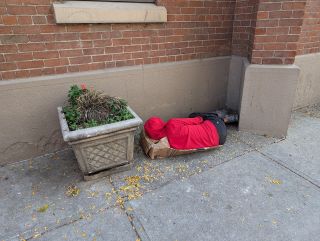
Source: Bethany Yeiser
Dear sir:
I wanted to thank you and applaud your initiative to end homelessness throughout the United Kingdom and, by extension, throughout the world.
My name is Bethany Yeiser. I serve as co-founder and president of a charitable American organization called CURESZ (Comprehensive Understanding via Research and Education into SchiZophrenia), which advocates for people with brain disorders that often lead to homelessness. I would like to tell you about my own journey to becoming homeless for four years in Los Angeles due to untreated schizophrenia. I would also like to share what it took to bring me off the streets and enable me to enjoy a new life in recovery and in housing.
I had been an honor student studying biochemistry at the University of Southern California before becoming homeless. I did well in school and had a life of promise. But during my fourth year of college, I had a psychotic episode. I became severely paranoid of family, friends, and the professors I had known over my years at the university. I moved out of my dorm room and began hiding in libraries and lounges. I was eating discarded food found in trash cans. I carried a few changes of light clothing with me in a small bag. For three years, I tried my best to blend in. I told myself I was not really homeless. I wish someone had gotten me help, but I had no idea I was ill and would never have sought help on my own.
In early 2006, three years into my homelessness, I began hearing a chorus of voices inside my mind. I immediately realized something was wrong, but convinced myself the experience was normal. The voices became worse every day. At this time, I began sleeping outside in a churchyard, which would continue for 13 months.
I would like to point out how difficult it was at that time to get me help. I had the option of living with my loving family, which would have done anything to help. I completely refused, paranoid of them. Another family I became friends with while homeless offered me a bedroom/bathroom suite in their beautiful house. I refused them as well. I was irrational and wanted to be homeless.
But eventually, I did get help. On March 3, 2007, a person living nearby finally called the police. This was the starting point of my recovery.
March 3, 2007 was the first day of my involuntary hospitalization. Being told I had a mental illness felt embarrassing and insulting. I was certain I was not ill. But of all the days of my life, this is the day I am the most grateful for. Because of that involuntary hospitalization, I would begin treatment that led to recovery and a new, thriving life, and the acceptance of stable housing.
When I was in the hospital, I wanted to return to my homeless life. I did not have the insight to know how horrible my life had become outside. My mind was shattered by my illness, and I could not make reasonable decisions for myself. But on medication for schizophrenia, my mind began to clear, and finally, I wanted a stable place to live.
In the United States, most people who are chronically homeless are living with severe mental illnesses, commonly including schizophrenia. They usually have no insight into their illness and do not believe they need help, as I did not. Many of them, like me, are offered free housing but choose not to accept it due to symptoms of their illness, such as paranoia. This makes the problem of getting them housed even more complicated.
I share my story today because I want you to understand how many people who are homeless actually prefer to be homeless, due to a brain disorder. Offering them housing is not enough.
Working with the CURESZ Foundation, I see countless families with a loved one who has schizophrenia and wants to live outside. But in order for these people to be mandated treatment, at least in the United States, they must be severely ill—a danger to self or others. It is hard to find inpatient treatment, as it is only available to those who are the very most ill.
The homeless community is so diverse. You see people who have had bad luck, a lost job, medical bills, etc., and they just need some temporary help and some time to recover. But dealing with the chronically homeless population, which includes so many with severe mental illness, is much more difficult. Often, these people strongly resist help, and their only hope is involuntary hospitalization and mandated treatment. This was my experience.
Unfortunately, the use of drugs and alcohol can also complicate recovery. I have never used drugs or consumed alcohol personally, but it is important to see substance use as a disability.
As you work to end homelessness, please understand that desperate people with schizophrenia and other severe mental illnesses will often refuse to get help or leave the streets, even when housing is offered. But I recovered against all odds, and today, with the right treatment, many people do come off the streets and even thrive in their community.
Thank you for reading this letter, and thank you for the important work you have done and will do. I am available if you want to do me the honor of discussing schizophrenia, how it can lead to chronic homelessness, and the steps we need to take to combat this problem.
Yours faithfully,
Bethany Yeiser


